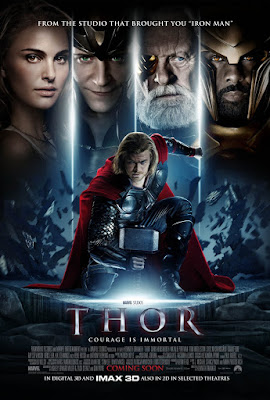 |
| Marvel's Thor (2011) |
When the brash Thor (Chris Hemsworth), son of the Asgardian king, Odin (Anthony Hopkins), is stripped of his title and power and banished to Earth for his insolence in provoking a conflict between Asgard and the Frost Giants of Jotunheim, what follows is a character arc very similar to that of Tony Stark's in the first Iron Man. The heart of this story is that of a man who never grew beyond being a spoiled brat learning to both take responsibility for his actions, and temper his contemptuous attitude with patience and respect. After falling for a mortal, the brilliant fringe scientist Jane Foster (Natalie Portman) and being fed a sinister lie by his traitorous brother, Loki (Tom Hiddleston), Thor grows into a man worthy of reclaiming what he's lost.
Much like Iron Man, if heroes are meant to instill in us virtues and ethics, then Thor presents a worthy hero. Not because he wields great power, but because he undergoes a profound change of heart. He goes from selfish and cocksure to selfless and modest, willing to give up his own life for the people of Earth. Similar to how Christ admonishes his disciples to deny themselves and take up their own cross in Luke 9, Thor quite literally dies a death to self. And only in dying does he find life again. In a blast of thunder, he is resurrected to reclaim his title and fearsome power, and this is what lends the film its transcendent quality.
This is the stuff of myth and legend, what C. S. Lewis called the myth of the Dying God in his wonderful essay, "Myth Became Fact." These myths of Pagan messiahs and Pagan gods who die and rise again in fantasy are "good dreams," Lewis calls them in Mere Christianity, echoes in fantasy of the Father's plan worked out in reality—myth becoming fact in a particular time and place in human history. These stories, these virtues, point to Christ, a kind of basic morality system common to all humans, however sinful we might be. The very fact that we can conceive of stories like the one told in Thor, these pure expressions of virtue, suggests that there is, in fact, the purest expression of virtue, or the greatest story ever told. The mortal characters in the film, specifically Stellan Skarsgård's Erik Selvig, even discuss this in the context of the myths and legends of Norse mythology coming to life before their very eyes.
Thor is a marked improvement over Iron Man 2. Within a fantasy of warring gods and monsters, the film finds its heart in a timeless and human story about a bad man learning to be good. Between Iron Man, the Hulk, and Thor, it's easy to see how these initial films in the MCU managed to capture audiences the world over, and should banish any lingering doubts as to whether or not the once-lambasted characters in the pages of funny little 20th century picture books have become some of the definitive myths and fables of our times.



No comments:
Post a Comment